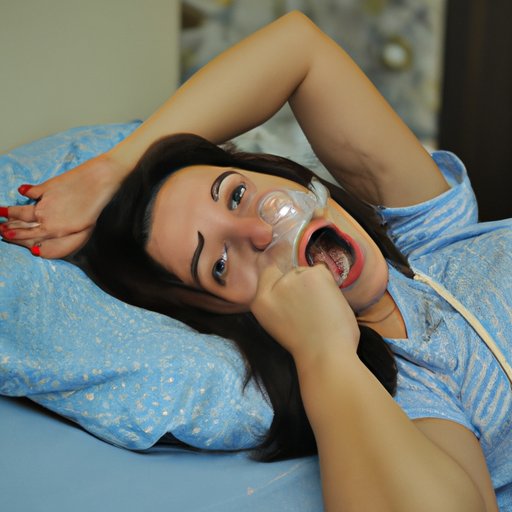
I. Introduction
Sleep apnea is a common sleep disorder that affects millions of people worldwide. This condition is characterized by a temporary cessation of breathing while sleeping. The most common type of sleep apnea is obstructive sleep apnea, where the airway is partially or completely blocked during sleep, leading to a lack of oxygen and disrupted sleep. Sleep apnea can have severe consequences if left untreated, including high blood pressure, heart disease, diabetes, and stroke. In this article, we will explore the best ways to treat sleep apnea and get a good night’s sleep.
II. 10 Tried and True Home Remedies for Treating Sleep Apnea
Before turning to medication or surgery, there are some home remedies that can help manage sleep apnea. These remedies are easy to implement and can provide relief for mild to moderate sleep apnea. Here are ten proven home remedies:
- Weight loss
- Positional therapy
- Nasal strips
- Lifestyle changes
- Continuous positive airway pressure (CPAP) machines
- Mandibular advancement devices (MADs)
- Dental appliances
- Herbal remedies
- Vitamin C and E
- Essential oils
III. The Complete Guide to Treating Sleep Apnea: Medication, Surgery, and Beyond
Home remedies can be effective for some sleep apnea sufferers, but they are not always enough. If your sleep apnea is severe, your doctor may recommend medical treatments such as:
- Continuous positive airway pressure (CPAP) machines
- Bilevel positive airway pressure (BiPAP) machines
- Adaptive servo-ventilation (ASV)
If these treatments are not effective, your doctor may recommend surgery, such as:
- Uvulopalatopharyngoplasty (UPPP)
- Maxillomandibular advancement (MMA)
- Surgical removal of the tonsils or adenoids
- Tracheostomy
There are also some experimental treatments being studied, such as hypoglossal nerve stimulation (HNS), which involves implanting a device that stimulates the nerves that control the tongue and throat muscles to keep the airway open during sleep.
IV. Sleep Better Tonight: Top Strategies for Managing Sleep Apnea
In addition to medical treatments, there are plenty of strategies you can try to manage sleep apnea. Here are a few general strategies:
- Elevate your head while sleeping
- Avoid alcohol and sedatives
- Avoid sleep-depriving habits such as smoking, caffeine, and heavy meals
- Incorporate regular exercise
- Practice good sleep hygiene by keeping regular sleeping hours and creating a peaceful bedroom environment
Lifestyle changes can also have a significant impact on sleep apnea. Here are a few tips:
- Quit smoking
- Limit alcohol and sedative use
- Stay active and maintain a healthy weight
- Avoid sleeping on your back
- Practice good sleep hygiene, such as keeping a regular sleep schedule and avoiding devices like laptops, smartphones, or the glowing light that affects circadian rhythm
V. Natural and Effective Ways to Treat Sleep Apnea Symptoms
Natural remedies can provide relief for some sleep apnea symptoms. Here are a few natural remedies you can try:
- Herbal remedies such as valerian root, passionflower, and chamomile tea
- Acupuncture and acupressure
- Breathing exercises such as the Buteyko method or Pranayama yoga
- Yoga postures that focus on breathing and relaxation
- Essential oils such as lavender oil or peppermint oil can help reduce snoring and improve breathing during sleep
VI. The Importance of Lifestyle Changes in Treating Sleep Apnea
Lifestyle changes can have a significant impact on treating sleep apnea. Some changes that can help manage sleep apnea include:
- Reducing unhealthy cholesterol and other blood lipids by following a plant-based or low-fat diet
- Maintaining a healthy weight
- Reducing daytime sleepiness by exercising and practicing good sleep hygiene
- Avoiding tobacco, caffeine, and liquor use in the evening
- Eating foods that help lessen the risk of inflammation, such as fatty fish, walnuts, and whole grains
VII. Understanding Your Options for Sleep Apnea Treatment: A Beginner’s Guide
There are various treatment options for sleep apnea, and it can seem overwhelming to choose between them. Some important things to consider when deciding on a treatment plan include the severity of your sleep apnea, your lifestyle, any other medical conditions you have, and the risks and benefits of each treatment. Consulting with a sleep specialist can help you make an informed decision. There are also various resources available to learn more about sleep apnea and treatment options, including websites and support groups for sleep apnea sufferers.
VIII. Conclusion
Sleep apnea can be a significant health issue that affects your overall quality of life, but it is treatable. Home remedies, medication, surgery, and lifestyle changes can all play a role in managing sleep apnea. Take the time to explore your options and consult with a doctor to find a treatment plan that works for you. With the right treatment, you can start getting better sleep and improving your overall health.





